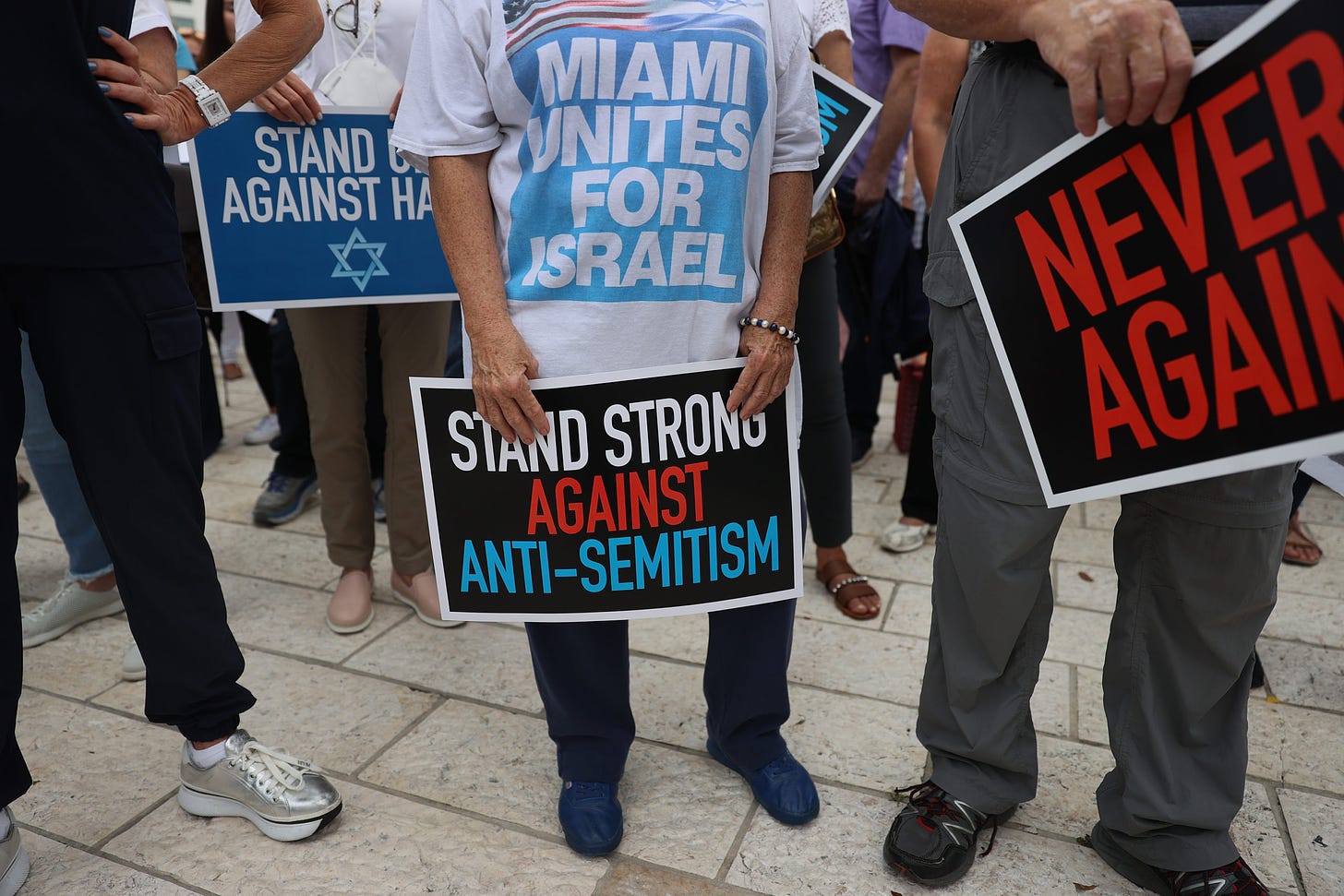The Fight Against Anti-Semitism Begins at Home
Confirm Deb Lipstadt. Then create a domestic anti-Semitism coordinator.

The Senate Foreign Relations Committee held a confirmation hearing last week for Holocaust scholar Deborah Lipstadt to serve as the U.S. special envoy to monitor and combat anti-Semitism. In response to the recent spate of anti-Semitic incidents across the United States—a shocking example of which took place in Colleyville, Texas last month when an armed man stormed Congregation Beth Israel—a growing number of voices have called for Lipstadt’s confirmation.
The role she could play domestically is limited, however. The special envoy’s mandate is aimed at addressing “acts of anti-Semitism and anti-Semitic incitement that occur in foreign countries.” (Emphasis added.)
To be sure, Professor Lipstadt should be confirmed, and swiftly. But this desired outcome will not resolve the growing problem of anti-Semitism in the United States, where Jews constitute just two percent of the population yet are the single most targeted group for anti-religious hate crimes in the country.
An adequate response to the rise in Jew-hatred in America would be to create a new position that, unlike the special envoy, has an exclusively domestic mandate. While maintaining the special envoy’s global mandate, the Biden administration should heed calls from international leaders like the U.N. special rapporteur on freedom of religion or belief and former special envoys to create a domestic anti-Semitism coordinator.
The idea for a domestic coordinator is not novel. In fact, the U.K., Germany, the Netherlands, Canada, Italy, Greece, and Romania are among a growing list of nations that have created comparable positions in the last few years to fight what U.N. Secretary General António Guterres has aptly called a “tsunami of hatred.”
Thankfully, the hostages in Colleyville escaped. Those in Pittsburgh, Poway, Jersey City, and Monsey weren’t as lucky.
New data shows that 90 percent of Jews in the United States are concerned about the state of anti-Semitism in America while 42 percent report having faced anti-Semitism directly or through family and friends in the last five years. Chief among them are Jewish students like myself on college and university campuses across America. Most alarming, though, is that in the last year, 39 percent of American Jews have changed their behavior by limiting their activities and concealing their Jewishness, due to concerns about anti-Semitism. Given the fact that crimes against Jews in New York City spiked 300 percent this January compared to January 2021, it makes sense why anti-Semitism is top of mind for Jews around America.
As the great-granddaughter of Jews who sought refuge in this goldene medina—the “golden land” of Jewish diasporic imagination for its embrace of tolerance and difference—the rise in intolerance and shameful indifference towards assaults on American Jews is not something that I can ignore.
But shouldn’t these numbers give every single American—regardless of race, religion or creed—pause? And doesn’t the scope and variety of these attacks demand a special response?
When an armed gunmen enters a Texas synagogue in the same month that an 8-year-old Jewish boy in Brooklyn is harassed and spat on days before swastikas are plastered on Union Station and a kosher bakery in Chicago is vandalized, it’s hard to explain away or sanitize America’s anti-Semitism problem. The problem is not confined to a geographic region; it’s not a problem of urban or rural populations.
And it’s not confined to one source, either. Anti-Semitism in its contemporary form is both a pernicious and pervasive phenomenon, occurring across the political spectrum, ranging from the left to the right, among white supremacist groups, members of terrorist groups that invoke Islam, and members of the black community. It festers online and in the media, blighting society at large.
The persistence of senseless attacks on American Jews and the failure, albeit unwitting but nonetheless alarming, of cultural influencers and public officials to see anti-Semitism when it doesn’t look like the right-wing fanatic who left eleven Jews dead at the Tree of Life Synagogue in Pittsburgh or the neo-Nazi torch bearers in Charlottesville, affirm the urgent need for the United States to join the expanding community of domestic anti-Semitism coordinators by appointing one of its own.
Here’s how this could have a remarkable impact.
A “domestic diplomat” could first and foremost provide a repository of knowledge and expertise on how to fight anti-Semitism in America. They could coordinate among relevant offices in federal agencies, and stakeholders on the state level that work on anti-Semitism issues, as well as the respective House and Senate bipartisan task forces on combating anti-Semitism. The coordinator could work with policymakers, academics, and civil society to develop a national action plan to prevent and combat anti-Semitism. The coordinator could serve as a primary contact for local Jewish communities and Jewish organizations and represent the U.S. at relevant thematic global gatherings.
Even more, acknowledging a problem in your own backyard can have cascading positive effects. By demonstrating a will to fight the issue at home, the United States would gain credibility for its efforts abroad. In that way, tackling the domestic rise of intolerance, hate, and violence against American Jews with a domestic coordinator would bolster the work of the special envoy. This pursuit of internal-external coherence on matters relating to freedom of religion or belief is one promoted by the State Department, and it’s something that could be achieved with a domestic anti-Semitism coordinator.
Recent events have served as a painful reminder of the potential for anti-Semitic conspiracy theories and misinformation to contribute to an environment in which violence, discrimination, and hatred can flourish. We need Deb Lipstadt to fight anti-Semitism abroad. But we also desperately need a coordinated effort to combat the issue at home in America—the goldene medina.



